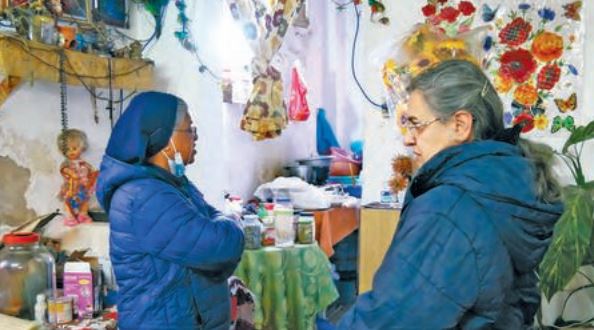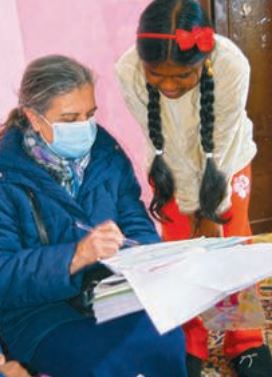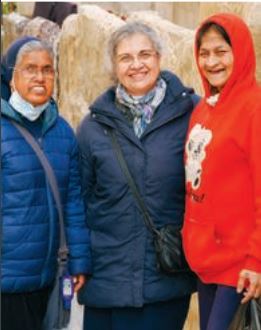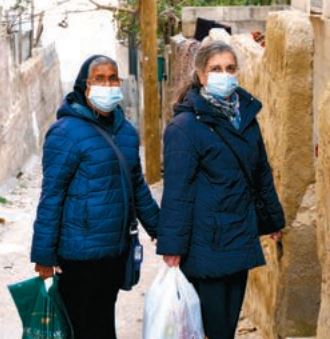
Ranjani’s Difficult Lot
By Ursula Schulten
Reporting from Amman, Jordan
Tens of thousands of women from Southeast Asia are migrants looking for work in Middle Eastern countries as domestic workers, in textile factories or the hospitality industry. But quite a few migrant workers fail to find jobs even far from home. The Salvatorian Sisters in Amman, Jordan take care of those who need help and may have to return home involuntarily.
If anything is cheap in Jordan, it’s the taxi driving. They can be seen everywhere, the yellow cars that cross the metropolis. We are on our way in the middle of rush hour from the apartment of the Salvatorian Sisters in the Jabal al Hussein district, across the city. The taxi driver is in a hurry. “Give me 1.5 dinars”, 1.50 JD – that’s around 1.90 euros, a ridiculous price for almost eight kilometers. But if you consider that you can get 14 small flatbreads at the bakery for this price, taxi driving in Amman is a luxury for many. As soon as we exit the taxi at a major intersection, Ranjani is already waiting for us. In flipflops she hurries ahead of us, quickly into a small shop to buy some sweets. A short time later, they are on the table of her apartment.

Ranjani, 55, has been in Jordan for 30 years. She has worked in different families and households. Her apartment in the basement, about 25 square meters, is very cramped, the walls damp, the plaster on the wall crumbling. All belongings are piled up on tables and in the corners. The mini kitchen is full of dishes, pots, glasses, and spices. What seems rather poor to us is Ranjani’s little kingdom. She pays 90 JD, the equivalent of 115 euros, for this dwelling. But she cannot pay this for two months, because she lacks the money with only one job and only 20 JD weekly earnings. Friends and other women support her a little by bringing food and helping her afford medicines. Ranjani has diabetes and the tablets are expensive. We also bring something with us – oil, rice, tea – and are immediately gifted with a tea and freshly prepared lentil curry. Hospitality is a valuable asset!
Ranjani is pleased with the visit. She smiles and apologizes “My teeth … many had to be removed. I do not have enough money for new ones.” Rajani does not have health insurance.
From the rain to the eaves
Women in particular leave their families and try to earn money abroad. Often the living conditions at home are unbearable, and there is a lack of work and income. This is what women in Jordan hope to earn by working for 2 years in textile factories or as domestic servants. Usually, it is a matter of financing the education and training of one’s own children in their home country. Parents want their children to be more than cheap wage workers. Many women go abroad unprepared, hardly knowing what to expect. They know neither the culture nor language. Through agencies in Sri Lanka, they are placed with families in Jordan.
Again and again, these work assignments fail. Domestic violence and sexual assault cause women to flee the families they live with. Passports and papers are often in the possession of the employer, so a woman in breach of a contract can find herself at risk of being in Jordan illegally. They seek shelter in the slums, lose the connection with their family at home. Occasionally they enter new relationships that may lead to unplanned pregnancies, problems with the police, deportation, and a slow impoverishment. Salvatorian Sisters frequently ask themselves, “How can this situation be prevented, or better help be given?”
Diverse challenges

About 20 years ago, the Salvatorian Sisters began their work in Jordan. They devote themselves whole-heartedly to accompanying and advising migrant workers from Asia. Sr. Theresa, who herself comes from Sri Lanka, says: “Our tasks as sisters are diverse. With a Jordanian priest and the Mother Teresa sisters, we have the opportunity to visit prisoners of different nationalities. We provide legal assistance where necessary. It is important that we listen to people, listen to their life stories, and support them with necessary things such as toothbrushes, soap, shower gel, towel, laundry, and phone cards.”
The sisters take time to visit sick migrants, whether at home or in hospital, and those who suffer from the loss of a beloved family member in their distant homeland. “Prayer and blessing give them special support and comfort in these moments,” adds Sr. Mirjam.
The impact of the pandemic
The pandemic was not without consequences in Jordan either. Many so-called “part-timers” (without permanent employment in families) have lost their jobs and thus their income. It is a vicious cycle. “Here we try to provide advice and practical help to give people the necessities of life. We always assemble food packages with rice, oil, sugar, hygiene products, soap products, etc., as well as clothes and some household items.” Sr. Deepa, who comes from India, has been strengthening the small community in Amman for 3 years.
Returning to Sri Lanka?

Ranjani’s sister has invited her to come back. But Sri Lanka is currently suffering from its biggest economic crisis since 1948. The local people themselves are struggling to survive.
On the other hand, Ranjani has been without a visa for two years – illegally in the country. She can’t move or leave Amman, let alone Jordan. The cost of a visa is 45 JD per month. Ranjani can hardly pay her rent, let alone a visa. All that remains is the hope of a general amnesty from the king. This involves the issuance of individual prison sentences or a free visa to leave the country. But even then, Ranjani lacks the money for the ticket and the shipping of her small, modest belongings, which have accumulated over the years.
The prospect of work and earnings, even under the most difficult conditions, has attracted many women and men to the Gulf States and the Middle East as migrant workers in factories, on construction sites, and as domestic workers. Competition and wage dumping are fierce. While Sri Lankan workers were once cheap and in demand, they are now being displaced by women from Bangladesh and Africa. The women know that their demanded wage determines their value. Those who offer themselves and their labor cheaply, make few demands, do not contradict, currently have the best chances of getting a job. The Sri Lankan state has little interest in intervening and leaves the business to the more than 100 agencies in the country that recruit and place workers. The foreign exchange that flowed back into the country in this way has long boosted the economy.
The pandemic has also put a damper on this. Many migrants lost their jobs and were stuck in Jordan. Many Jordanian families feared that the employees would bring COVID-19 into their homes and dismissed the women. The number of migrant workers living in Jordan has decreased. However, considering the severe economic crisis in Sri Lanka, it is likely to rise again. Hundreds of thousands crowd in front of the foreign embassies in Colombo, wanting a visa to offer themselves abroad as a low-wage force.
What will the future bring?

“Our work has hardly changed”, says Sr. Mirjam. “Today we look after significantly more women from Bangladesh, India and Kenya, who ask us for advice and are in need. The women pass on our address to each other. We go to the slums and factories to talk to the families who employ the women. We organize legal and medical assistance and take care of minors and children. We meet for talks, prayer, and worship. Pastoral support is important – whether they are Buddhists or Christians, we are there for everyone.”
There are many emotions after meeting the people who fight their way through life under the most difficult conditions in a foreign country. The Salvatorian Sisters remain and live by their side here in Amman. They bring the Good News, hope, and light to places where so many are at a loss and see no way out. They follow the small, life-giving steps according to the Gospel: feeding the hungry, assisting strangers, clothing the naked, visiting the sick and those in prison. This will continue to be their mission in the future.
We gladly share an article from Salvator weltweit, the publication of our Salvatorian Sisters in Germany. We will continue sharing translated stories from the 2022/2023 edition in the coming months. If you would like to view the German version, we invite you to explore the online publication: https://www.salvatorianerinnen-weltweit.de/eg/wp-content/uploads/2022/11/salvator_weltweit_2022.pdf
